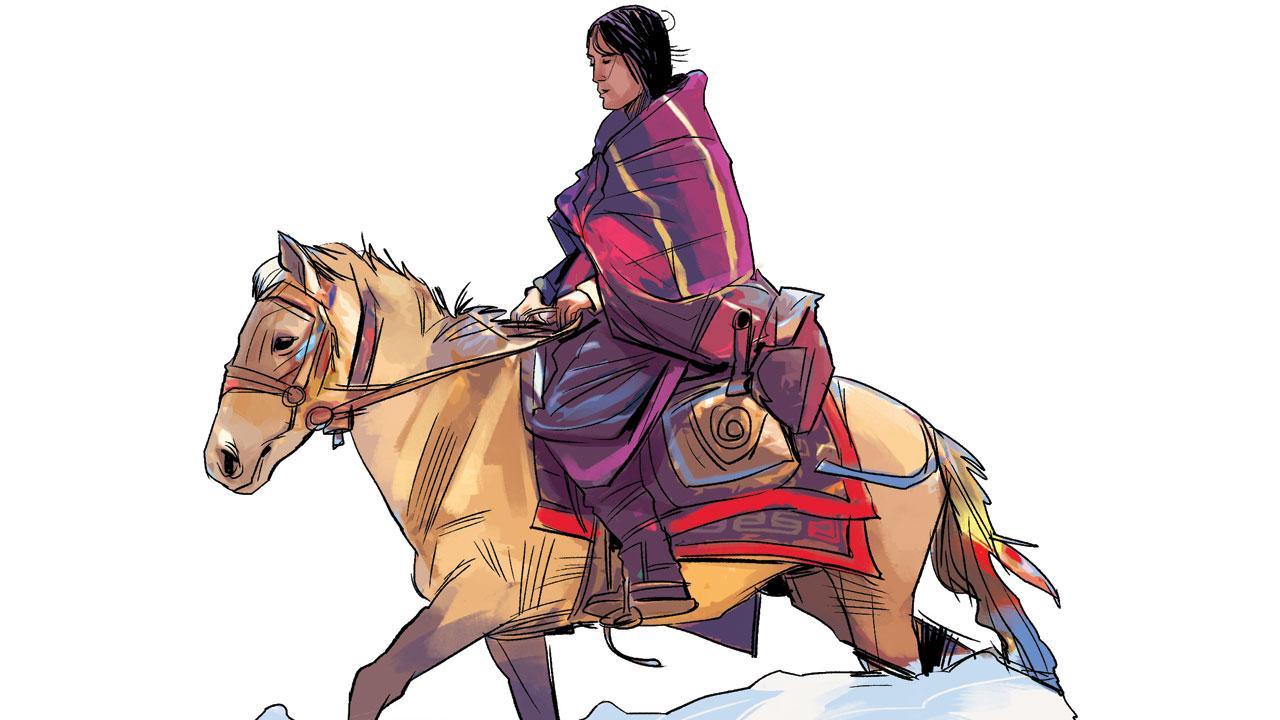Its selection is also a historic landmark for South Asian cinema, the first time a Nepali film has made it to the Berlinale Competition

Illustration/Uday Mohite
![]() I’ve never seen an Indian film like Min Bahadur Bham’s Shambhala (mystic heaven), from Nepal, that is in the Competition section of the 74th Berlin Film Festival. It is visually spectacular, with top tech credits, yet, in absolute contrast to the big, loud Indian actioners like RRR or Baahubali, it uses its craftsmanship to create spaces for quietly philosophical, inner journeys.
I’ve never seen an Indian film like Min Bahadur Bham’s Shambhala (mystic heaven), from Nepal, that is in the Competition section of the 74th Berlin Film Festival. It is visually spectacular, with top tech credits, yet, in absolute contrast to the big, loud Indian actioners like RRR or Baahubali, it uses its craftsmanship to create spaces for quietly philosophical, inner journeys.
ADVERTISEMENT
Its selection is also a historic landmark for South Asian cinema, the first time a Nepali film has made it to the Berlinale Competition. Significantly, India does not have a film in Competition this year—and hasn’t had one since Buddhadeb Dasgupta’s Charachar (Shelter of Wings) in 1994—full 30 years! Bham is, along with Deepak Rauniyar and Nabin Subba, one of Nepal’s most globally acclaimed filmmakers.
His short film, Bansulli The Flute, was the Venice Film Festival’s first Nepali film selection in 2012; his Kalo Pothi (Black Hen) won the Fedeora Award for best film in the Venice Film Festival’s Critics’ Week in 2015, and it was Nepal’s Oscar entry. Now, his Shambhala is the first Nepali film in Berlinale Competition. As producer, he has also backed films by many young Nepali directors, including Saurav Ghimire’s Songs of Love and Hate, produced with Minsho Limbu, that earned an Honourable Mention in the Berlinale’s Generation 14plus section last week. Bham has two Master’s degrees in Buddhist Philosophy and Political Science, and he’s doing a PhD in Anthropology—and it shows.
The film, in Tibetan and Nepali, is set high in the Himalayas. The lovely Pema (Thinley Lhamo) is married to three brothers— Tashi (Tenzin Dalha), the monk Karma (Sonam Topden) and Dawa (Karma Wangyal Gurung), still a schoolboy. When Tashi leaves for a few months to Lhasa for trading, and Pema is pregnant, there’s bazaar gossip that Ram, a school teacher, is the father. When Tashi vanishes from Lhasa on hearing the rumours, Pema initially sets off on a journey across the Himalayas to convince him of her fidelity, but her journey turns out to be a deeper one, of self-discovery and liberation.
The film is magnificently crafted. The credit goes to Bham and the Kazakh director of photography Aziz Jan Baki (earlier Aziz Zhambakiyev, winner of the Silver Bear in Berlin for Outstanding Artistic Contribution for cinematography for Harmony Lessons; he’s lived in Varanasi, is a Shiva bhakt and now goes by the name of Shivang). He shoots the film in widescreen “scope” (2.39:1 aspect ratio), to better capture the grandeur of the mighty Himalayan snow peaks; he also uses tight close ups of faces like Pema’s to hint at her inner emotions, while also hinting at man’s insignificance in the vast landscape, with exquisite compositions and mise-en-scene. Bham’s direction distils multiple ideas about karma, reincarnation, a monk’s life v/s a householder’s life, and is a devastating critique of patriarchy and misogyny. The screenplay, by Bham and Abinash Bikram Shah, also references our epics like the Mahabharata (a woman is married to three husbands, similar to Draupadi’s story); and the Ramayana (a wife chooses to journey alone after her husband suspects her of being ‘unfaithful,’ similar to Sita’s story). Most of the actors, of Tibetan origin, have had limited acting experience, except Tenzin Dalha (Margarita with a Straw, Axone), or are local non-professionals; the charming Sonam Topden is a real-life monk-turned-popular singer/composer-turned actor. His Karma is a tender but chaste monk-husband. He tells Pema, “It doesn’t matter whose child it is. Just the act of giving birth itself is a miracle.” Yet, when Tashi is absconding, and Pema asks him if he will accept her child, he has no answer. The men are definitely found wanting in this tale, including the nice guys; the women are made of sterner stuff. But the screenplay also subverts stereotypes, investing a half-abandoned child with hints of divinity. It keeps the emotional drama low key, while making anthropological detours into rituals including ‘sky burials’ (Tibetans offer their dead to vultures, as some Parsis do). This also makes for a challenging 150-minute run-time, with longueurs (editors are Liao Ching-Sung and Kiran Shrestha)—yet Pema’s tough journey of quiet solitude also makes for an immersive experience.
Nhyoo Bajracharya’s music is evocative, with an extraordinary hypnotic chant by Buddhist nun-singer Ani Choying Drolma, over the end credits. The sound design too, by Tu Duu-Chih (Taiwan; In the Mood for Love, The Assassin), Dikesh Khadki Shahi and others, is marvellous. Women crew include Debaki Rai and Salina Shakya (Executive Producers); five women Co-Producers Catherine Dussart, Verona Meier, Shuk Fong Chong, Zeynep Koray and Justine O; and Singer/Composer Ani Choying Drolma. I hope the film screens theatrically, globally and in India.
Meenakshi Shedde is India and South Asia Delegate to the Berlin International Film Festival, National Award-winning critic, curator to festivals worldwide and journalist.
Reach her at meenakshi.shedde@mid-day.com
 Subscribe today by clicking the link and stay updated with the latest news!" Click here!
Subscribe today by clicking the link and stay updated with the latest news!" Click here!







